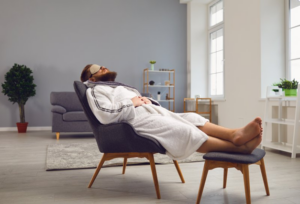
Many people are familiar with the sight of their grandparent or spouse falling asleep in their favorite recliner – or maybe you’re the one who got a little too cozy and slipped off into dreamland! Either way, this experience might have left you wondering how anyone could get good quality sleep while sitting up.
As it turns out, there are some pretty logical reasons why recliners can improve your rest. Keep reading to see whether it’s time to say “goodbye” to your mattress.
Gravity Is Your Friend
For people with bad acid reflux, heartburn, or obstructive sleep apnea (OSA), gravity is a huge help in relieving disruptive sleep symptoms. If you have OSA, for example, sleeping with your head elevated can push oral tissue away from your airway, decreasing your nightly apnea instances. It also encourages stomach acid to stay in your stomach, which is great for patients with GERD (gastroesophageal reflux disease) or other heartburn-related issues.
Recliners Are Easier on Your Back
If you have a bad back or have had spinal surgery, you know how hard it can be to get in and out of bed at night. Plus, a backache can definitely make it difficult to get comfortable and fall asleep. Depending on whether you have upper, mid, or lower back pain, you may want to recline with a pillow for spinal support, but overall many people find that it’s much easier to settle into and get up from a recliner than a mattress.
When NOT to Sleep in A Recliner
Bearing all this in mind, you may not want to get rid of your traditional bedding just yet! Regularly sleeping in a recliner can have some risks. Here are some instances where this could be a bad idea:
- When you have breathing or lung problems. You want your airway to be open, but sleeping with your shoulders hunched forward can put more strain on your lungs.
- When you’re prone to joint stiffness. A recliner restricts your sleep position, which can cause tightness in your hips, calves, or hamstrings.
- You have a history of blood clot complications. Unless you have a footrest for your recliner or are willing to wear compression socks, serious blood clots could form in your legs.
Falling asleep in your favorite recliner could very well help you rest more fully, but it probably shouldn’t be something you do every night. Be sure to check in with your doctor before trying this out on a regular basis!
About the Author
Dr. Dean Hutto is a proud member of the American Academy of Dental Sleep Medicine, and has studied this field with some of the most well-known names in the business. He’s well-qualified to help patients get better rest with custom oral appliances. If you’re tired of sleeping in a recliner or would like a more long-term fix for nightly disruptions, call Dr. Hutto’s office at 281-422-8249.
